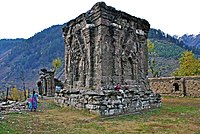
Punjab is a province of Pakistan. Located in central-eastern region of the country, Punjab is the second-largest province of Pakistan by land area and the largest by population. Lahore is the capital and the largest city of the province. Other major cities include Faisalabad, Rawalpindi, Gujranwala and Multan.

Nankana Sahib is a city and capital of Nankana Sahib District in the Punjab province of Pakistan. It is named after the first Guru of the Sikhs, Guru Nanak, who was born in the city and first began preaching here. Nankana Sahib is among the most important religious sites for the Sikh religion. It is located about 91 km (57 mi) west of Lahore and about 75 km (47 mi) east of Faisalabad. According to the census of 2017 the city has a population of 110,135 inhabitants. Until 2005, it was a part of the Sheikhupura District.

Gujranwala is a city and capital of Gujranwala Division located in Pakistan. It is also known as "City of Wrestlers" and is quite famous for its food. It is the 5th most populous city proper after Karachi, Lahore, Faisalabad and Rawalpindi respectively. Founded in the 18th century, Gujranwala is a relatively modern town compared to the many nearby millennia-old cities of northern Punjab. The city served as the capital of the Sukerchakia Misl state between 1763 and 1799, and is the birthplace of the founder of the Sikh Empire, Maharaja Ranjit Singh.
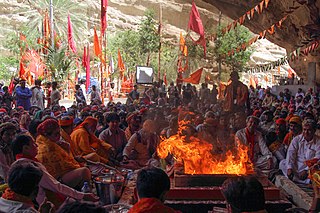
Hinduism is the second largest religious affiliation in Pakistan after Islam. Though Hinduism was one of the dominant faiths in the region a few centuries ago, Hindus accounted for just 2.14% of Pakistan's population in the 2017 Pakistani census. The Umerkot district has the highest percentage of Hindu residents in the country at 52.2%, while Tharparkar district has the most Hindus in absolute numbers at 714,698.

The Akal Takht is one of five takhts of the Sikhs. It is located in the Darbar Sahib complex in Amritsar, Punjab, India. The Akal Takht was built by Guru Hargobind as a place of justice and consideration of temporal issues; the highest seat of earthly authority of the Khalsa and the place of the Jathedar, the highest spokesman of the Sikhs.

Sialkot District, is one of the districts of the Punjab province of Pakistan. It is located in the Majha region of Punjab, otherwise the northeast of the province. The city of Sialkot is the capital of the district. The Sialkot Cantonment was established in 1852.

The Shri Katas Raj Temples, also known as Qila Katas, is a complex of several Hindu temples connected to one another by walkways. The temple complex surrounds a pond named Katas which is regarded as sacred by Hindus. The complex is located in the Potohar Plateau region of Pakistan's Punjab province. The temples are located in municipal committee Choa Saidanshah, and are near the M2 Motorway.
Rahon is a city and a municipal council in the district Shaheed Bhagat Singh Nagar of the Indian state of Punjab. Rahon is in Doaba region of Punjab. Doaba also known as Bist Doab, is the region of Punjab, India that lies between the Beas River and the Sutlej River. A famous battle was fought here between Sikhs and Mughals i.e Battle of Rahon (1710).
Ranbir Singh Pora is a town and nagar panchayat, near city of Jammu in Jammu district of the Indian Union territory of Jammu and Kashmir. It was the first planned city of Jammu and Kashmir

Sharada Peeth is a ruined Hindu temple and ancient centre of learning located in the Neelum Valley of Pakistan-administered Azad Kashmir in the disputed Kashmir region. Between the 6th and 12th centuries CE, it was among the most prominent temple universities in the Indian subcontinent. Known in particular for its library, stories recount scholars travelling long distances to access its texts. It played a key role in the development and popularisation of the Sharada script in North India, causing the script to be named after it, and Kashmir to acquire the moniker "Sharada Desh", meaning "country of Sharada".

Puran Bhagat is a mythical prince of Sialkot from Punjabi folklore. According to the story, he was son of King Salban of Sialkot and an elder brother of prince Rasalu.
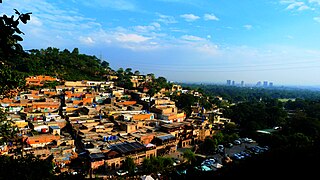
Saidpur is a village and union council (UC-1) located in a ravine in Pakistan in the Margalla Hills, near the Daman-e-Koh overlook, in the Islamabad Capital Territory. It is a Mughal Era village that has a wide spectrum of religious and cultural heritage. It serves as a tourist spot for locals as well as foreigners.

Jainism in Pakistan has an extensive heritage and history, with several ancient Jain shrines scattered across the country. Baba Dharam Dass was a holy man whose tomb is located near the bank of a creek called near Chawinda Phatic, behind the agricultural main office in Pasrur, near the city of Sialkot in Punjab, Pakistan. Another prominent Jain monk of the region was Vijayanandsuri of Gujranwala, whose samadhi still stands in the city.

Jammu is a city in Indian-administered Jammu and Kashmir in the disputed Kashmir region. It is the winter capital of Jammu and Kashmir, which is an Indian-administered union territory. It is the headquarters and the largest city in Jammu district. Lying on the banks of the river Tawi, the city of Jammu, with an area of 240 km2 (93 sq mi), is surrounded by the Himalayas in the north and the northern plains in the south. Jammu is the second-most populous city of the union territory. Jammu is known as "City of Temples" for its ancient temples and Hindu shrines.

The Evacuee Trust Property Board, a statutory board of the Government of Pakistan, is a key government department which administers evacuee properties, including educational, charitable or religious trusts left behind by Hindus and Sikhs who migrated to India after partition. It also maintains places of worship belonging to Hindus and Sikhs in Pakistan.

The Shri Krishna mandir, or the Krishna Temple, is a Hindu temple located in Rawalpindi in the Punjab province of Pakistan. It is situated between the Rawalpindi railway station and Kabari Bazaar in Saddar. Currently, it is one of the two places of worship for the approximately 7,000 Hindus living in Rawalpindi and Islamabad, with the other handful of temples being non-functional. Hindu festivals like Holi and Diwali are celebrated here.
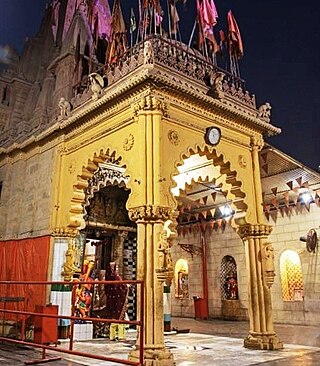
The Panchmukhi Hanuman Mandir is a historic Hindu mandir in Karachi, Pakistan The mandir was declared as a national heritage under the Sindh Cultural Heritage (Preservation) Act 1994 and is believed to be at least 1,500 years old.
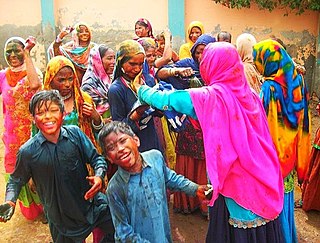
Hinduism is a minority religion in Punjab province of Pakistan followed by about 0.2% of its population. Punjab has the second largest number of Hindus in Pakistan after Sindh. Hinduism is followed mainly in the Southern Punjab districts of Rahim Yar Khan and Bahawalpur.


















